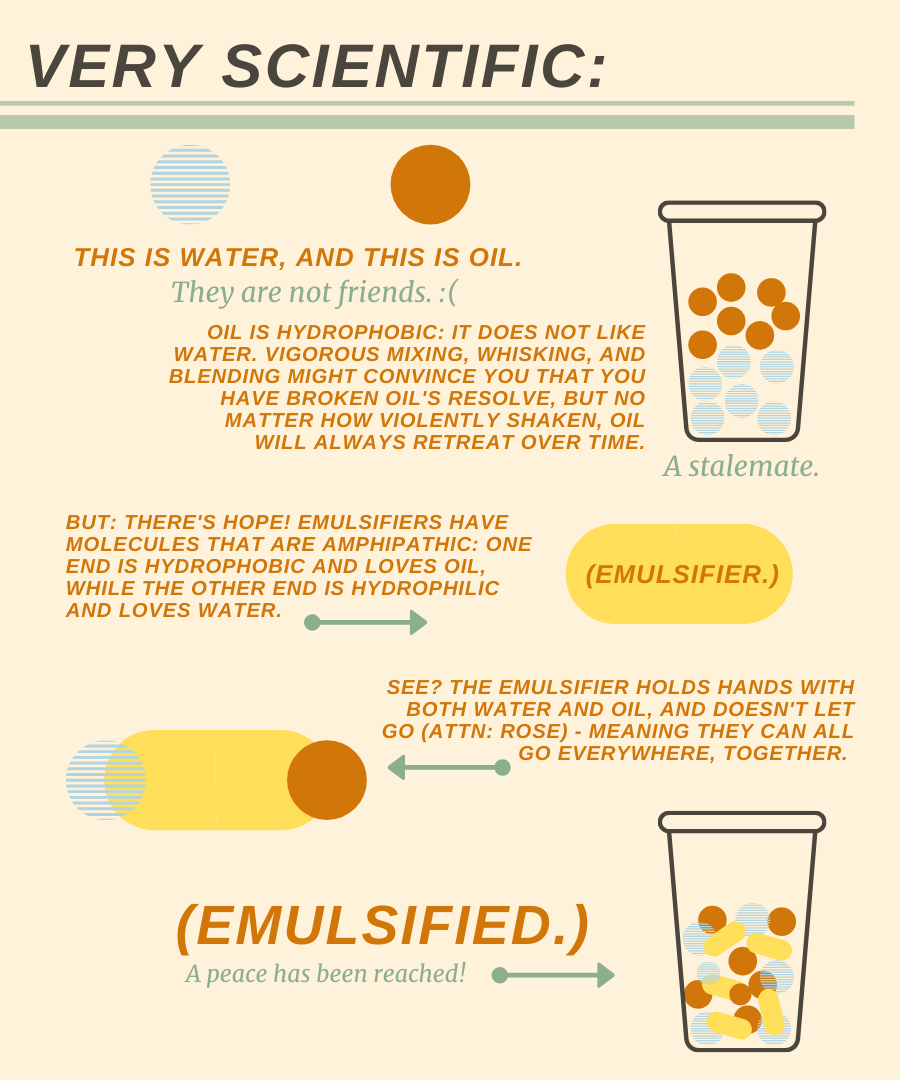All Regarding the Duty of an Emulsifier in Food and Its Value in Modern Food
Emulsifiers are critical in modern-day food, helping with the mix of immiscible liquids like oil and water. Their capacity to maintain mixes boosts the structure and flavor of various food. From salad dressings to baked products, emulsifiers play a considerable duty in both commercial and home cooking. The scientific research behind their function and the future advancements in their usage remain much less checked out. What much more could be discovered about these necessary culinary representatives?
Comprehending Emulsification: The Scientific Research Behind the Refine
Although emulsification might look like an easy cooking method, it involves intricate clinical concepts that are essential for producing stable mixtures of immiscible liquids, such as oil and water. At the heart of this process exists the principle of surface area stress, which avoids both liquids from blending naturally. Emulsifiers, compounds that minimize surface stress, play an important function in assisting in the mix of these liquids. They possess both hydrophilic (water-attracting) and hydrophobic (water-repelling) buildings, permitting them to anchor themselves at the user interface in between oil and water.
When an emulsifier is introduced and the mix is agitated, it develops a protective obstacle around spread droplets of one liquid within the other, maintaining the combination. This activity not just boosts structure and mouthfeel in food but also adds to their visual appeal. Emulsifier In Food. Understanding the scientific research behind emulsification is basic in modern cuisine, allowing chefs to produce a range of sauces, dressings, and emulsified dishes
Usual Kinds Of Emulsifiers Made Use Of in Food
Emulsifiers are essential components in the food market, playing a vital role in maintaining combinations of oil and water. Various sorts of emulsifiers are frequently made use of, each with one-of-a-kind residential properties fit for different applications. Lecithin, obtained from soybeans or egg yolks, is one of one of the most prominent all-natural emulsifiers, frequently located in delicious chocolates and dressings. Mono- and diglycerides, which are acquired from glycerol and fats, are extensively made use of in baked goods and margarine to boost appearance and prolong life span. An additional typical emulsifier is polysorbate 80, preferred for its capability to improve the consistency of gelato and sauces. Additionally, xanthan gum and guar periodontal offer as thickening agents that additionally add to emulsification in gluten-free items. These emulsifiers are essential to creating a stable, tasty product in modern food formulations, making sure a pleasurable sensory experience for consumers.
The Function of Emulsifiers in Different Food Products
A selection of foodstuff rely on emulsifiers to achieve wanted appearances and stability. These materials help with the mixing of immiscible fluids, such as oil and water, which is vital in several processed foods. In salad dressings, emulsifiers aid preserve a constant combination, avoiding splitting up and boosting rack life. In baked products, they add to an uniform crumb framework and dampness retention, enhancing overall quality.
Emulsifiers likewise play a significant role in milk items, such as ice lotion and yogurt, where they stabilize fat blobs, making sure a smooth mouthfeel. In addition, in sauces their website and condiments, they improve viscosity and enhance spreadability. This functionality is important in the production of chocolates, margarine, and mayonnaise, where a natural product is essential. In general, making use of emulsifiers in various foodstuff is essential to contemporary food production, enhancing stability and uniformity throughout a wide variety of things.
Just How Emulsifiers Enhance Structure and Taste

When incorporated into food, emulsifiers considerably enhance both appearance and taste, producing an even more enjoyable consuming experience. These compounds assist in the blending of components that commonly do not mix well, such as oil and water, causing a smoother, creamier uniformity. This not only enhances mouthfeel yet likewise permits flavors to disperse evenly throughout the item, amplifying the general preference.

Emulsifiers in Home Food Preparation: Tips and Techniques
Just how can home chefs efficiently utilize emulsifiers to boost their meals? Emulsifiers play an essential duty in attaining desirable structures and tastes in homemade dishes. For circumstances, using egg yolks in mayo or hollandaise sauce allows for a steady emulsion, combining oil and water effectively. Home cooks can additionally try out mustard, which works as an emulsifier in vinaigrettes, making certain a smooth consistency.
In cooking, integrating lecithin, discovered in egg yolks or soy, can enhance dough security and moisture retention. Furthermore, using business emulsifiers like xanthan gum or guar gum can help thicken sauces and dressings while keeping a luscious mouthfeel.
When developing ice lotions or whipped toppings, emulsifiers can stop ice crystal formation, leading to a smoother structure. By understanding these strategies, home chefs can greatly elevate their cooking creations, supplying constant and enjoyable meals that showcase the power of emulsification.
The Future of Emulsifiers in Culinary Technology
As the culinary world proceeds to develop, the function of emulsifiers is poised to end up being progressively cutting-edge and diverse. Developments in food scientific research are resulting in the development of brand-new emulsifying agents obtained from all-natural resources, which cater to health-conscious customers and improve the sensory high qualities of meals. Technologies such as plant-based emulsifiers are gaining grip, allowing cooks to develop vegan and allergen-free options without endangering structure or taste.
Furthermore, the usage of emulsifiers in molecular gastronomy is expanding, enabling chefs to try out distinct useful link textures and discussions that captivate diners. As sustainability comes to be a top priority, the future may see a shift in the direction of environment-friendly emulsifiers that lower environmental influence.
Inevitably, emulsifiers will certainly proceed to play an important function in cooking advancement, connecting the space between tradition original site and modernity, and permitting chefs to press the limits of creative thinking in their kitchen areas.
Often Asked Inquiries

Are Emulsifiers Safe for Individuals With Allergic reactions?
Emulsifiers can be risk-free for people with allergic reactions, depending on their particular level of sensitivities. Certain emulsifiers, derived from allergenic sources like soy or eggs, may set off responses, requiring careful active ingredient analysis and appointment with medical care professionals.
Just How Do Emulsifiers Influence Food Shelf Life?
Emulsifiers boost food service life by stabilizing mixes, preventing splitting up, and reducing microbial growth. This security helps preserve appearance and flavor over time, permitting items to stay safe and attractive for intake longer than without emulsifiers.
Can Emulsifiers Be Derived From Natural Sources?
Yes, emulsifiers can be originated from all-natural sources such as plants, eggs, and milk items (Emulsifier In Food). These all-natural emulsifiers aid maintain blends, improving structure and uniformity in numerous food applications while being chosen for health-conscious consumers
What Are the Ecological Impacts of Emulsifier Manufacturing?
The ecological effects of emulsifier manufacturing consist of resource depletion, environment destruction, and contamination from artificial procedures. Natural emulsifier sourcing can alleviate some effects, however generally, industrial techniques still pose significant environmental challenges to communities worldwide.

Exist Vegan Emulsifiers Available in the marketplace?
Yes, there are numerous vegan emulsifiers offered out there, such as lecithin stemmed from soy or sunflower, guar periodontal, and xanthan periodontal. These choices accommodate plant-based diet plans without jeopardizing emulsifying properties.
Emulsifiers are vital ingredients in the food sector, playing a crucial role in supporting combinations of oil and water. A selection of food products count on emulsifiers to attain wanted appearances and stability. When incorporated right into food items, emulsifiers greatly enhance both appearance and flavor, developing an even more delightful eating experience. Furthermore, emulsifiers can maintain air pockets in whipped items like lotions and mousses, leading to a light and airy texture. Emulsifiers improve food shelf life by stabilizing mixtures, protecting against splitting up, and minimizing microbial development.